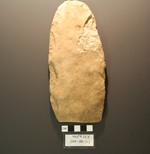The Field School in Archaeology focuses on the human history of the Southern Cumberland Plateau. The Plateau is internationally recognized for its biodiversity, containing some of the most biologically rich, temperate forests in the world. Within these forests and deep coves is a little known and highly diverse rich prehistoric and historic record of human landuse.
 Field experiences include prehistoric rockshelter and historic house excavation. Past excavations recovered evidence of plants, animal bone fragments and tools from the hunter-gatherers of the Early Archaic as well as early horticulturalists of the Middle Woodland Period (ca. 8,000 to 2,000 years old). In addition to these excavations the field school will also spend time at the King Farm, also located on the Sewanee campus. This site represents an interdisciplinary study area looking at land use change through time from the prehistoric Native American occupations up through early 20th century subsistence farming.
Field experiences include prehistoric rockshelter and historic house excavation. Past excavations recovered evidence of plants, animal bone fragments and tools from the hunter-gatherers of the Early Archaic as well as early horticulturalists of the Middle Woodland Period (ca. 8,000 to 2,000 years old). In addition to these excavations the field school will also spend time at the King Farm, also located on the Sewanee campus. This site represents an interdisciplinary study area looking at land use change through time from the prehistoric Native American occupations up through early 20th century subsistence farming.
In the field, skills gained will include excavation, artifact recovery, mapping, and recording stratigraphy. Laboratory skills will include artifact cataloging, photography and floatation for botanical remains.
During this six-week course we will use geophysical remote sensing equipment including soil resistivity, ground penetrating radar and magnetometetry. These non invasive techniques are becoming increasingly important in archaeology today and this is a unique field opportunity to gain hands-on experience with this technology.
Tuition and Fees: $2,950, All-inclusive for camping and work-week food
Prerequisites: None
Credit hours: Anthropology 357 for 6 credit hours
For more information, contact the Director of the Field School, Dr. Sarah Sherwood.

